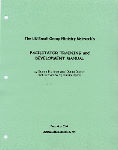I had occasion recently to visit one of our congregations with my brother. He has moved to a new town and had been checking out for himself the possibilities of the local UU congregation. I was in town for the weekend and he invited me to join him.
It was a pleasant congregation in a well kept building, and the service moved along in a sprightly fashion. I was pleased to be joining them for worship. About a third of the way through the sermon, much to my surprise, I realized that the minister's intent in this service seemed to be to revive their Small Group Ministry/Covenant Group Program. It took me by surprise. My brother nudged me. I'd helped him start a program in his previous (UCC) congregation. He hadn't seen this coming either.
I felt so bad. Let me say that after more than a decade of engagement with small group/covenant group development and growth, I am more convinced than ever of the possibility and potential that covenant group programs hold for our congregations and our movement. A healthy covenant group program strengthens a congregation, can connect people in deep and supportive ways, and encourages individual spiritual growth in ways that deepen the spiritual capacity of the whole congregation. What's not to like?
So, it is painful to me when I encounter efforts that ignore the accumulated wisdom and experience of the last decade (which, I might point out, is made readily available through the Small Group Ministry Network! www.smallgroupminisry.net.)
So, I had to wonder: Why were we well into the sermon before I had a clue? Why were there no lay people up there sharing the effort? Where were the testimonials? Where were the attractive and fun handouts? Where was the vision of a stronger and more resilient congregation? I even bumped into someone on my way out the door who recognized me from a training she had attended years ago and who had helped start a program in that congregation years ago.
Now, there is no way to understand the situation of any congregation from the observations of a Sunday morning visit, but I did feel bad that this well intentioned effort did not seem to be informed by the good practices we have come to understand. I wish them the best, but I did not come away encouraged.
And, as it happens, a couple of weeks later I was in touch with a friend who had helped to re-invigorate a program in the congregation he had been called to serve. They have doubled their participation and a significant percentage of the congregation is engaged with one another in a covenant group program! Yikes! Good news.
I asked him if he would write a quick review of the important steps that he and the congregation took in turning around in their program and he wrote:
Here are what I consider to be critical steps in reviving a stagnant SGM program:
- Enroll the "converts." Find 2 or 3 SGM advocates who are willing to partner with the minister in the effort to revive/expand the program. This should be a lay-led initiative, not minister-driven (at least not visibly minister-driven)
- Train and re-train facilitators. Many existing facilitators need to brush up on their skills. New facilitators = new groups.
- "Brand" the program. Perhaps "Small Group Ministry" isn't the right term in your congregation (and maybe it is). Create a logo, catchphrase or other way to capture the imaginations of the congregation.
- Build a "buzz." Create a campaign to tease and entice interest. Posters, buttons, "Ask Me About Small Groups," testimonials (BRIEF) in worship services, etc. Build up to a "launch date."
- Start from scratch. Resist the urge to keep existing groups together. Require everyone, new and existing SGM participants, to sign up for the days/times that work for them (1st, 2nd, 3rd) without knowledge of the identity of the facilitators or other participants (no "favorites")
- Make the launch date a celebration. Make SGM the central focus for that Sunday, including in the worship service. I created space in our service for people to fill out the sign-ups, then had the ushers collect them. We got 75% of our participants this way.
- Prepare new topics, train new facilitators to keep it going and growing.
The most important consideration is in the first step: a successful covenant group program is a partnership. With that in place, and with a bit of planning, the next steps can help you build or revive a program.
And then -- and I just love this thought -- on a Sunday morning you can say to a visitor, "Welcome, we have a great small group ministry program, and if you are interested, in no time at all we can have you sitting down with a group where we can get to know you and you can get to know us!" Now, that's a welcome.










 HEART TO HEART: Fourteen Gatherings for Reflection and Sharing, April 2009
HEART TO HEART: Fourteen Gatherings for Reflection and Sharing, April 2009